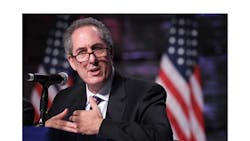Toughen Patent Laws if You Want Investors, US Says to India
A top U.S. trade envoy urged India on Tuesday to strengthen its drug and other intellectual property laws, saying such a move is needed to draw vital investment to spur a sputtering economy.
The call came as international charity Medecins Sans Frontieres in a statement accused the U.S. Trade Representative’s office and global pharmaceutical industry of pressuring India to change its patent laws to "put corporate profits over people’s health."
Without an Indian focus on patent protection, "there will be no pipeline of drugs to be made into generics after a certain time," U.S. Trade Representative Michael Froman said in New Delhi.
He was speaking after a two-day visit to meet officials of the new right-wing government led by Narendra Modi, elected in May in a landslide win.
"To have a knowledge-based economy means having a strong intellectual property regime and strong enforcement regime," Froman said.
India needs to better safeguard patents, copyrights, trade secrets and licensing and should seek to halt piracy and counterfeiting to attract investment, he said.
At the same time, "We in the U.S. very much committed (to affordable health-care)," Froman said, highlighting steps by President Barack Obama to provide universal health care.
Froman added that 80% of U.S. prescriptions are generic -- many of them involving made-in-India drugs.
Trading ties between India and the United States have been strained recently, with Washington unhappy over India’s Intellectual Property Rights (IPR) regime.
The US government has placed India on the so-called "Special 301 Watch List" -- nations whose intellectual property protection Washington feels should be tracked closely.
Indian law, which demands "genuine drug innovation" rather than small tweaks for the granting of patents, has helped millions of people in India and across the developing world get access to cheap life-saving medicines.
Froman was speaking after the first meeting in four years of a trade panel on which representatives from the world's largest economy and the emerging market giant sit.
Two-way U.S.-India trade now stands at $100 billion. The countries aim to boost the figure to $500 billion but have set no timetable.
They reached a breakthrough earlier this month in a food subsidies dispute that threatened to derail a landmark World Trade Organization pact to ease global trade barriers.
Analysts say the U.S.-India relationship is now moving ahead on all fronts after plunging to a low last year following the U.S. arrest of an Indian diplomat.
The new mood of diplomatic warmth was underscored last week when new Prime Minister Narendra Modi invited Obama to be "chief guest" at India's annual Republic Day parade in January.
Copyright Agence France-Presse, 2014
About the Author
Agence France-Presse
Copyright Agence France-Presse, 2002-2025. AFP text, photos, graphics and logos shall not be reproduced, published, broadcast, rewritten for broadcast or publication or redistributed directly or indirectly in any medium. AFP shall not be held liable for any delays, inaccuracies, errors or omissions in any AFP content, or for any actions taken in consequence.
